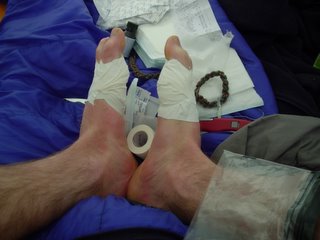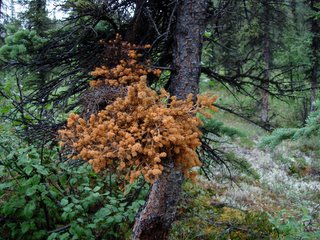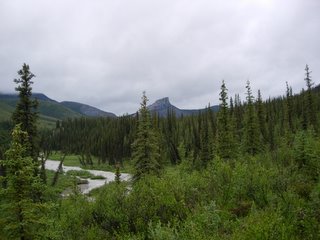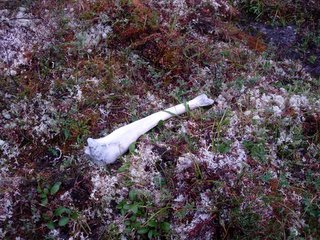Arctic Trek V
Laying in my tent, sleeping at times, writing for hours, quietly listening to the drops, I waited for the rain to stop falling. Though it's not a bad place to hang out-- the color of the tent filters the light into a pleasant golden glow-- after 24 hours I was ready to get out. My drinking water was gone, I was ravenously hungry, and my bladder was far, far too full.

At a lull in the weather I began preparing myself for a peek out of my den. I unzipped the front flap and got socks and long underwear. I put on my rain pants, boots and gaiters, a long-sleeved shirt and my hat, even my wet wool gloves. It was time to test out my blistered feet and get a bite to eat. Then I'd be ready to head up to the pass with a light load, or head back down the valley with everything. Of course it was difficult to get out of a warm, comfortable sleeping bag and into the cold wetness, but I looked forward to the continued challenge of this lonely existence. There was much to be excited about.
The positive potentials I foresaw dissipated rather quickly when I stood up. The stabbing pain that had started so suddenly the day before on the ball of my right foot had gotten worse despite all my best efforts to heal it. Both my feet were heavily bandaged beneath my socks, and though the skin had plenty of time to dry in the warmth of my sleeping bag, my doctoring wasn't enough. As I walked to my food storage area, I realized that I was going to have to push through the pain and hope for the best.
As if the harm to my feet wasn't enough, more trouble was right around the corner. As I approached my bear-proof food cannister I got a better view of Chimney creek in the valley bottom. The three-inch-deep stream I'd been walking in the day before had become a raging torrent, brown and churning, knee-high and filling the whole creek bed, its side channels, and washing over the gravel bars. If Chimney Creek had risen this much so high in the drainage, there was no way I'd be able to ford the river further downstream. I was going to have to cross once and make my way down one side for better or for worse.
down one side for better or for worse.
I packed everything and walked down to the creek-turned-river to look for the best ford. A wide, straight section of the stream is best. At bends and bows the water speeds up as it piles into the banks, carving out swift, deep channels that are dangerous to cross, especially when you're alone. Likewise, where the channel is narrow the water is deeper and moves faster. So I found a spot where I could see the water rifling over the rocks and crossed there. The brown water was strong, kicking my feet downstream as soon as I pulled weight off them. I made it across without incident, but I'd been pushed downstream quite a distance.
After a short distance on the move I decided that it would have to be a long distance day. It was going to continue raining and I wanted to get away from the river and closer to Glacier pass and my route back to Wiseman. It would be a long haul, but I'd have plenty of opportunity to rest later. I continued down the valley to the beginning of the Glacier River, fording Roy Creek, which was also very swollen and fast, and further down past the swampy field and to the big bend in the river where I stopped to take off my shoes and check on my feet. It was cool and very wet, but the breeze was enough to keep the mosquitoes away. That made me happy.
I walked and walked, walked and walked, through tundra and spruce and mountains and shrubs, antlers and bones; the hushed roaring of chocolate brown water leaping high against the river bank. More alone than ever, I had this recurring feeling of being literally beside myself. My body was there trudging along, step by step, automatically, with my mind sort of floating just to the right and behind. It was almost like the cusp of sleep: that faint dizziness and sense of warping space, but my body was strong and awake, hiking without pause. How could I be more aware, more alive? I could hear and see everything. Yet walking became a question manifested in physical form, "Is this happening?"
and mountains and shrubs, antlers and bones; the hushed roaring of chocolate brown water leaping high against the river bank. More alone than ever, I had this recurring feeling of being literally beside myself. My body was there trudging along, step by step, automatically, with my mind sort of floating just to the right and behind. It was almost like the cusp of sleep: that faint dizziness and sense of warping space, but my body was strong and awake, hiking without pause. How could I be more aware, more alive? I could hear and see everything. Yet walking became a question manifested in physical form, "Is this happening?"
My eyes began to take in more than just the contour of the land, the strange spindly forest, the tundra. In this loneliness I came face to face with myself. With no conscious attempt at introspection, my perception of personal identity rose out of its normal transparency and became a substantial vision in my mind. In loops of song and plodding footstep rhythm it was as though I became a duality, watching myself move through the world, making decisions, searching for mental occupation, experiencing waves of emotion.
Without the distractions of other people I began to see how changing physical circumstances cause me to assume different faces, using different parts of myself to deal with experience. I saw these internal countenances as built from the cumulative experience of living. Usually I'm using them without awareness of them, solidifying them unconsciously into reflexive entities that act independently according to the situation. My life appeared to me as an iterated algorithm, flowering into what seems like a human entity with a will, but is really only a very complex reaction machine. In my wilderness mind, I was beginning to see these algorithms as independent personalities living in my consciousness.
This awareness of differentiation within my mind was profound , so much that I spent pages exploring it in my journal. (12 July, 2005) t right myself. I kicked and wiggled like a beetle on its back, but I wasn't going to let the tussocks get the better of me. Eventually I turned myself over and continued on. I don't know why I didn't just take off the backpack.
t right myself. I kicked and wiggled like a beetle on its back, but I wasn't going to let the tussocks get the better of me. Eventually I turned myself over and continued on. I don't know why I didn't just take off the backpack.
After 18 hours on the trail and 20 miles I made it to that odd little aluminum tag that I'd camped next to several nights before. It had rained for the better part of the day and I was soaked from head to toe. When I took off my gloves I wrung nearly a cup of water out of them, and poured out what had been collecting inside my waterproof mitten shells. On top of that discomfort, I'd begun to have a problem keeping my stool in appropriately solid condition and consiquently had dosed several immodiums and my stomach was in a bit of a gaseous uproar. Above all though I was completely exhausted. It was all I could do to set up my camp and climb into bed.

At a lull in the weather I began preparing myself for a peek out of my den. I unzipped the front flap and got socks and long underwear. I put on my rain pants, boots and gaiters, a long-sleeved shirt and my hat, even my wet wool gloves. It was time to test out my blistered feet and get a bite to eat. Then I'd be ready to head up to the pass with a light load, or head back down the valley with everything. Of course it was difficult to get out of a warm, comfortable sleeping bag and into the cold wetness, but I looked forward to the continued challenge of this lonely existence. There was much to be excited about.
The positive potentials I foresaw dissipated rather quickly when I stood up. The stabbing pain that had started so suddenly the day before on the ball of my right foot had gotten worse despite all my best efforts to heal it. Both my feet were heavily bandaged beneath my socks, and though the skin had plenty of time to dry in the warmth of my sleeping bag, my doctoring wasn't enough. As I walked to my food storage area, I realized that I was going to have to push through the pain and hope for the best.
As if the harm to my feet wasn't enough, more trouble was right around the corner. As I approached my bear-proof food cannister I got a better view of Chimney creek in the valley bottom. The three-inch-deep stream I'd been walking in the day before had become a raging torrent, brown and churning, knee-high and filling the whole creek bed, its side channels, and washing over the gravel bars. If Chimney Creek had risen this much so high in the drainage, there was no way I'd be able to ford the river further downstream. I was going to have to cross once and make my way
 down one side for better or for worse.
down one side for better or for worse.I packed everything and walked down to the creek-turned-river to look for the best ford. A wide, straight section of the stream is best. At bends and bows the water speeds up as it piles into the banks, carving out swift, deep channels that are dangerous to cross, especially when you're alone. Likewise, where the channel is narrow the water is deeper and moves faster. So I found a spot where I could see the water rifling over the rocks and crossed there. The brown water was strong, kicking my feet downstream as soon as I pulled weight off them. I made it across without incident, but I'd been pushed downstream quite a distance.
After a short distance on the move I decided that it would have to be a long distance day. It was going to continue raining and I wanted to get away from the river and closer to Glacier pass and my route back to Wiseman. It would be a long haul, but I'd have plenty of opportunity to rest later. I continued down the valley to the beginning of the Glacier River, fording Roy Creek, which was also very swollen and fast, and further down past the swampy field and to the big bend in the river where I stopped to take off my shoes and check on my feet. It was cool and very wet, but the breeze was enough to keep the mosquitoes away. That made me happy.
I walked and walked, walked and walked, through tundra and spruce
 and mountains and shrubs, antlers and bones; the hushed roaring of chocolate brown water leaping high against the river bank. More alone than ever, I had this recurring feeling of being literally beside myself. My body was there trudging along, step by step, automatically, with my mind sort of floating just to the right and behind. It was almost like the cusp of sleep: that faint dizziness and sense of warping space, but my body was strong and awake, hiking without pause. How could I be more aware, more alive? I could hear and see everything. Yet walking became a question manifested in physical form, "Is this happening?"
and mountains and shrubs, antlers and bones; the hushed roaring of chocolate brown water leaping high against the river bank. More alone than ever, I had this recurring feeling of being literally beside myself. My body was there trudging along, step by step, automatically, with my mind sort of floating just to the right and behind. It was almost like the cusp of sleep: that faint dizziness and sense of warping space, but my body was strong and awake, hiking without pause. How could I be more aware, more alive? I could hear and see everything. Yet walking became a question manifested in physical form, "Is this happening?"My eyes began to take in more than just the contour of the land, the strange spindly forest, the tundra. In this loneliness I came face to face with myself. With no conscious attempt at introspection, my perception of personal identity rose out of its normal transparency and became a substantial vision in my mind. In loops of song and plodding footstep rhythm it was as though I became a duality, watching myself move through the world, making decisions, searching for mental occupation, experiencing waves of emotion.
Without the distractions of other people I began to see how changing physical circumstances cause me to assume different faces, using different parts of myself to deal with experience. I saw these internal countenances as built from the cumulative experience of living. Usually I'm using them without awareness of them, solidifying them unconsciously into reflexive entities that act independently according to the situation. My life appeared to me as an iterated algorithm, flowering into what seems like a human entity with a will, but is really only a very complex reaction machine. In my wilderness mind, I was beginning to see these algorithms as independent personalities living in my consciousness.
This awareness of differentiation within my mind was profound , so much that I spent pages exploring it in my journal. (12 July, 2005)
"There's this part that makes decisions about pragmatic matters. It's a part of me that for whatever reason I picture as a small man with a mustache. Then there's the part that lives in Olympia and thinks about family and friends. That part is so familiar as to be transparent. I picture it as a view of my backyard in the early summer or the alley facing Otto's behind the State Theater. Then there's the part that is pure determination, the part that overcomes whining and internal strife and pushes me forward. It is kind of akin to the mustache part but I picture it more as me, my physical body and face like I'd see in a photograph. Then of course there's the whiner, the part that must be overcome to get anywhere. That part I picture as myself as a little kid."With these thoughts swirling in my head I continued on with a goal of reaching the spot that I'd camped on the first night of my trip. It was a long way and fatigue was beginning to set in. On my way across the last field of tussocks I was so tired that I fell over. My backpack got wedged in a trough and I couldn'
 t right myself. I kicked and wiggled like a beetle on its back, but I wasn't going to let the tussocks get the better of me. Eventually I turned myself over and continued on. I don't know why I didn't just take off the backpack.
t right myself. I kicked and wiggled like a beetle on its back, but I wasn't going to let the tussocks get the better of me. Eventually I turned myself over and continued on. I don't know why I didn't just take off the backpack.After 18 hours on the trail and 20 miles I made it to that odd little aluminum tag that I'd camped next to several nights before. It had rained for the better part of the day and I was soaked from head to toe. When I took off my gloves I wrung nearly a cup of water out of them, and poured out what had been collecting inside my waterproof mitten shells. On top of that discomfort, I'd begun to have a problem keeping my stool in appropriately solid condition and consiquently had dosed several immodiums and my stomach was in a bit of a gaseous uproar. Above all though I was completely exhausted. It was all I could do to set up my camp and climb into bed.

Comments